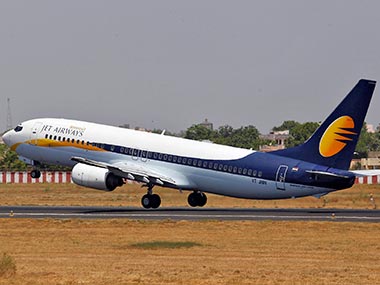Jet Airways was obviously not fibbing when it reiterated time and again this year that the equity deal with Etihad Airways is critical to its very survival. The deal is expected to fructify shortly and will see Etihad pump in over $600 million into cash-starved Jet Airways. But will this be enough? Auditors to Jet have made it clear (after Jet posted highest ever losses for the September quarter yesterday) that its continuation as a “going concern” is dependent on funds it receives from Etihad. Even these funds may not be enough to steer Jet out of financial trouble.
The first thing that Etihad’s money will do is provide some relief to Jet on paring its debt and reducing servicing costs. It is also expected to help the airline better negotiate suppliers’ contracts. But will it provide adequate working capital cushion and help Jet stem the bleeding? Jet funds subsidiary JetLite’s operations and has itself acknowledged that JetLite’s networth has become negative, which puts in doubt JetLite’s ability to return the loans provided by Jet Airways. Another reason for Jet to worry.
[caption id=“attachment_1086683” align=“alignleft” width=“380”]
 Jet Airways was obviously not fibbing when it reiterated time and again this year that the equity deal with Etihad Airways is critical to its very survival. The deal is expected to fructify shortly and will see Etihad pump in over $600 million into cash-starved Jet Airways. Reuters[/caption]
Jet Airways was obviously not fibbing when it reiterated time and again this year that the equity deal with Etihad Airways is critical to its very survival. The deal is expected to fructify shortly and will see Etihad pump in over $600 million into cash-starved Jet Airways. Reuters[/caption]
In a conference call with analysts today, senior Jet officials said that the equity deal with Etihad will “certainly” be completed this quarter as only one permission, from the Competition Commission of India, remains."
Impact Shorts
More ShortsBut concerns on Jet are unlikely to wane even after the Etihad funds arrive. Auditors of the airline have clearly said :“The appropriateness of assumption of going concern is dependent upon implementation of the alliance with strategic partnerand/or the company’s ability to raise requisite finance/generate cash flows in future to meet its obligations, including financial support to its subsidiary.”
A story on the Business Today website this morning points out that Jet increased its current liabilities further during the first two quarters of this financial year as its short term borrowings went up by Rs 528 crore, from Rs 1952 crore in FY13 to Rs 2480 crore. The story also says that Jet’s trade payables have increased for the first two quarters of this financial year by Rs 680 crore from Rs 4752 crore in last financial year to Rs 5432 crore for the half year ended September 30. Also, its current liabilities have gone up by Rs 1471 crore during the same period.
One example of how Jet is finding it difficult to meet liabilities here: it has reportedly defaulted on payment of over Rs 100 crore as airport fees and has requested the civil aviation ministry and the Airports Authority of India (AAI) to extend the deadline payment to March 31, 2014. It has also reportedly sought a relaxation of the one- month additional security deposit of Rs 60 crore for defaulting on payment for availing airport services.
In the analyst conference call today, Jet officials explained that Rs 674 crore out of the total loss before tax this year of Rs 891 crore was on account of charges such as aircraft maintenance charges, airport navigation costs and due to increase in fuel prices during the quarter. They also said that Jet group’s market share rose from 22.7% to 25% during the quarter; systemwide seat factor was up to 78.2% against 75% in the same quarter last year and yields were higher by about 15%.
The airline officials also said that debt on its books as of September was $1.9 and the average cost of debt was 5.1% which will come down to 4-4.2% when Etihad’s money comes in. Funds from Etihad are expected to quickly take care of the $350 million high cost rupee debt. This component of borrowings attracts a high 13% rate of interest and by retiring all of it, the airline will not only substantially reduce its overall interest repayments but also be able to put cash on the table for better renegotiation of several contracts with suppliers.
Anyway, at least $1.4 billion of the total debt on Jet’s books is aircraft debt which is backed by assets (the aircraft) and need not be repaid before term. This only leaves another $350 million which is anyway dollar debt at interest rates of 7-8% and again does not need to be repaid in a hurry.
Jet says the current quarter should see it perform much better as this is the traditional peak season for airlines in India. It says advance purchase trends show increasing load factors across business class and in general. But sources in Air India, the only other full service carrier, say aircraft occupancies are at record lows in October till now despite festive ferver. They say their airline has seen at least 30% empty seats this month while other airlines including Jet may have seen domestic occupancies of less than 65% , which means a third of domestic flights remain empty. So even if yields (revenue per passenger) will now show an increase for Jet, are these enough to reverse the losing spree of the last two quarters?
Jet needs to take drastic measures to keep its bleeding balance sheet from weakening further. Officials said today that a network wide study on fleet and route planning should be completed by October end and should help them plan better on integration of network with Etihad as well as on domestic expansion.
)